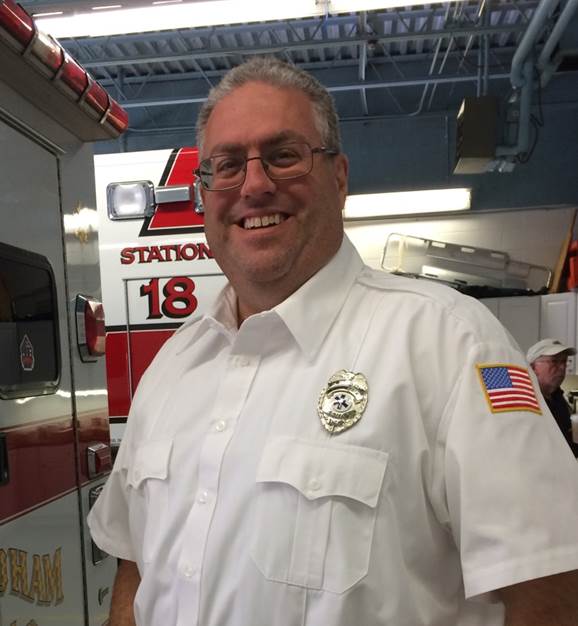|
Today was our final practical exams, a requirement for graduation from the EMT course. Designed to test our knowledge and understanding of all things EMT, covering medical and trauma assessments along with key skills including airway management, bandaging and splinting, CPR and AED usage, and pharmacological interventions such as EPI-Pen and Nitroglycerin administration. And although the final practical exams were designed to test the skills I have gained over the past 4 months, in the end it taught me perhaps the most important lesson of all -- a reminder that being humble and keeping an open mind may just be the most important EMT skills I can master. While the EMT course has been challenging, especially for someone who has been out of the day-to-day experience of classes, studying, and test taking for almost 30 years, I felt that I had done pretty well for myself. My quiz and exam grades were always high, and while there was a lot of memorization to accomplish, my own life experiences often helped to put class material in context and perspective. Eighteen months as a driver for the squad gave me an additional sense of how to interact with patients, and the experience of having observed other squad EMTs actually putting some of these skills in action in the course of our calls might have even offered me an edge in some scenarios. Through the class, the practical exams had gone extremely well, with several instructors telling my that I appeared to have that special quality that would make me a good EMT. I passed through all the practical exams without requiring remediation or a second (and final) attempt to demonstrate a critical skill. And then there was today. Final exams. And on the fourth and final skill station, I made a huge mistake, one that I won't quickly or easily forget. EMS is not a solo sport. Sure, there will be times when an EMT may be the first to arrive at a scene, or the first person to greet and engage a patient. And yes, in some cases, you may be miles from help and relying solely upon your own skills to provide aid to someone else.
But under normal circumstances, we operate as a team in our squad calls, with each member of the team reliant upon the others to ensure that we are collectively doing the best things we can, whether deciding on how to move a patient, gathering background and history while someone else is collecting vitals, anticipating the need for additional equipment or paramedic support before someone else makes a specific request, or ensuring that we disconnect an oxygen line from our main tank to a portable one before we move a patient from the ambulance to the hospital door. My failure today caused the students that were part of my team to similarly fail the testing station. As a result, we were remediated as a team, with one of our instructors walking us back through the scenario and giving us a chance to revisit, reconsider, and make corrections to our actions and activities. I've been feeling guilty and angry about this ever since, since it was pure ego on my own part that drove much of this. Feeling perhaps a bit too cocky from my other successes, I forgot one of the most basic lessons and made a critical assumption that my index of suspicion, pointing to a specific issue, was undoubtedly correct. As a result, while I recognized that the potential for a critical life threat existed, I didn't connect-the-dots with other pieces of information gathered by my team members during our individual assessment activities, and therefore under-estimated the level of risk our patient was actually in, putting their life closer to the edge (in a pretend scenario, of course). The positive outcome was that, as a team, we were still providing proper treatments. The ommission, however, was that we didn't do it as aggressively as was warranted, which could have resulted in significant complications at a later point in time. I goofed. I developed the dreaded tunnel-vision we were warned could happen, and while neither of my team members stopped me to suggest a full review of what we knew (signs, symptoms, vitals, history) or what other conditions could result in those results, I still feel like I let the team down. My ego certainly took a beating today, because I should (and do) know better. I simply got complacent, and wanted to complete this final activity and bring closure to the final practical exams, because the scenario we were presented with seemed, on the surface, like a no-brainer situation. I guess this is what being an EMT is like -- having to keep your ego in check, and make sure your opening your mind to considering all possible reasons that a patient can present symptoms, even when the answer seems almost crystal clear from the start. It's now a lesson I won't be forgetting anytime soon. We've one final written quiz to complete, and then we'll be able to schedule for the NJ State Certification exam or the national test. So if you'll excuse me, I've got a whole book to review, and practice quizzes to do,
0 Comments
Your comment will be posted after it is approved.
Leave a Reply. |
AuthorJon Alperin, one of our MFAS volunteers, shares his journey to becoming an NJ certified EMT. from the Start
Here is Jon's journey, presented in time order:
Archives
June 2016
Categories
All
|


 RSS Feed
RSS Feed
